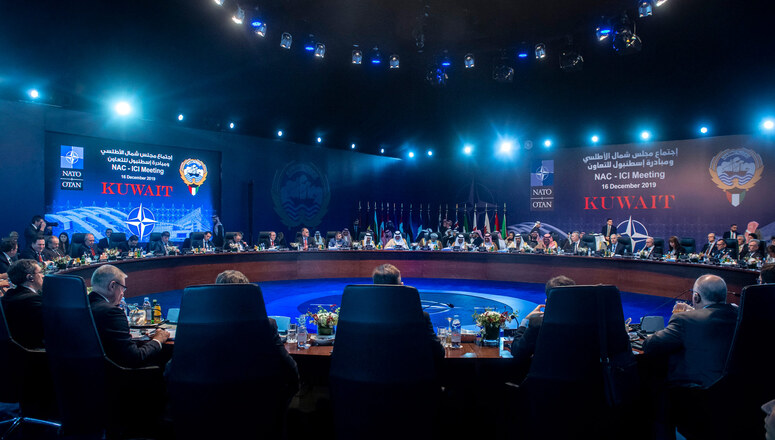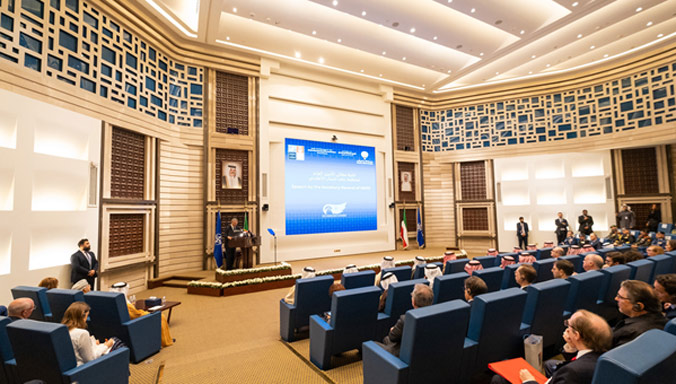Istanbul Cooperation Initiative
The Istanbul Cooperation Initiative (ICI) is a partnership forum that aims to contribute to long-term global and regional security by offering non-NATO countries in the broader Middle East region the opportunity to cooperate with NATO. Bahrain, Kuwait, Qatar and the United Arab Emirates currently participate in the Initiative.

- The Istanbul Cooperation Initiative was established at the 2004 NATO Summit in Istanbul to promote security cooperation on a bilateral basis between NATO and partner countries in the broader Middle East region.
- Currently, four countries participating in the Gulf Cooperation Council – Bahrain, Kuwait, Qatar and the United Arab Emirates (UAE) – have joined the Initiative, while Oman and Saudi Arabia participate in selected activities within the ICI framework.
- Initial consultations were held with members of the Gulf Cooperation Council, but the Initiative is open to all interested countries in the Middle East that support the objectives and principles of the ICI.
- Activities under the Initiative range from defence planning and defence budgeting to the fight against terrorism, the non-proliferation of weapons of mass destruction and civil preparedness.
- The Initiative is based on a foundation of six core principles: non-discrimination, self-differentiation, two-way engagement, non-imposition, diversity and complementarity to other international initiatives in the region.
The political dimension
The ICI is a platform through which NATO Allies and ICI partners can meet regularly and discuss security issues of common concern, while building a relationship of trust. It allows the Alliance to engage with experienced and knowledgeable partners to share best practices; it also represents an opportunity for members of the Gulf Cooperation Council to engage with NATO on security matters.
The security ties developed with Gulf partners are important to transatlantic security. Regular informal and formal meetings held at different levels (Heads of State and Government, Ambassadorial, expert and staff level, etc.) reinforce the political dimension of the Initiative, as do the numerous international conferences that have been held since 2005. Together with high-visibility events, several informal meetings have enabled discussions on security-related issues of common interest, on the perceptions of NATO in the Gulf, as well as on ways to develop the partnership.
In July 2024, NATO’s Secretary General designated a Special Representative for the Southern Neighbourhood to lead NATO’s engagement and cooperation with partners in the Middle East, North Africa and the Sahel regions, including ICI partners.

The former NATO Secretary General, Jens Stoltenberg, and the Crown Prince of Kuwait, his Highness Sheikh Sabah Khaled Al-Sabah, at the 20th anniversary event of the Istanbul Cooperation Initiative in New York in September 2024.
The ICI is based on the following key principles:
- Non-discrimination: all ICI partners are offered the same basis for cooperation and discussion with NATO;
- Self-differentiation: the Initiative allows for a tailored approach to the specific needs of each partner;
- Two-way engagement: the ICI is a two-way street, wherein the Alliance seeks contributions from partners for the success of the Initiative through a regular consultation process, and partners express their needs and goals to NATO;
- Non-imposition: partners are free to choose the pace and extent of their cooperation with NATO;
- Diversity: the ICI respects and takes into account the specific regional, cultural and political contexts of the respective partners;
- Complementarity: this partnership forum complements those of other international organisations in the region.
NATO's Partnerships and Cooperative Security Committee has overall responsibility for the ICI, as it does for all partnerships. The Committee is in charge of defining the procedures for the development of a menu of practical activities with interested countries and ensuring its successful implementation. It reports to the North Atlantic Council – NATO's principal political decision-making body – and prepares the groundwork for the decisions to be adopted by the North Atlantic Council on the ICI.
Practical cooperation
Practical cooperation between NATO and ICI partners takes different forms and can focus on areas such as military-to-military cooperation, the fight against terrorism, the threat of weapons of mass destruction, border security and civil preparedness.
Contribution to NATO-led missions and operations
ICI partners have contributed to many NATO-led operations and missions. For instance, Bahrain contributed to the International Security Assistance Force (ISAF) in Afghanistan. Kuwait signed the first-ever transit agreement in the Gulf with NATO in 2012, allowing for the movement of military equipment through the country; it is also part of the Shared Awareness and Deconfliction (SHADE) mechanism, an international initiative to combat piracy in the Indian Ocean. Qatar participated in Operation Unified Protector in Libya in 2011. The UAE has also contributed substantially to NATO operations and missions over the years, deploying Special Operations Forces in Afghanistan as part of Operation Enduring Freedom, which started in 2003, and joining ISAF in 2008; the UAE also participated in Operation Unified Protector in 2011.
Cooperation with ICI partners
Since its inception, cooperation between NATO and ICI partners has increased in depth and in scope. Individual work plans for each country are based on areas of activity proposed in the Partnership Cooperation Menu (PCM), such as defence transformation, civil-military cooperation, the fight against terrorism and civil preparedness.
In addition, other cooperation programmes complement what the PCM offers. Bahrain and the UAE are members of NATO's Interoperability Initiative and are active in the Science for Peace and Security Programme. They also participate in and contribute to training courses at the NATO Defense College in Rome, Italy, including the NATO Regional Cooperation Course, which aims to link issues of concern both to MD and ICI countries and to NATO, and to develop mutual understanding and networking among participants. Furthermore, ICI partners have collaborated with NATO forces in exercises organised by NATO's Euro-Atlantic Disaster Response Coordination Centre.
The multilateral dimension of the partnership started with the first NATO+4 meeting held in November 2008, followed by other such meetings. These meetings were held within the Istanbul Cooperation Initiative Group, which was established just after the launch of the Initiative; now discussed at the Partnerships and Cooperative Security Committee.
The NATO-ICI Regional Centre, established in Kuwait City in 2017, acts as a hub for the enhancement of practical cooperation between NATO and its Gulf partners. It aims to improve common understanding of security challenges and, through increased interoperability and standardization, enable closer cooperation. The hub promotes practical cooperation in various areas including strategic analysis, civil preparedness, military-to-military cooperation and public diplomacy. Its activities are open to all countries participating in the Istanbul Cooperation Initiative as well as Oman, Saudi Arabia and the Gulf Cooperation Council.

Former NATO Secretary General Jens Stoltenberg delivers remarks during the Istanbul Cooperation Initiative 15th anniversary ceremony at the NATO-ICI Regional Centre in Kuwait in December 2019.
Evolution
The ICI was launched on 28 June 2004 at the NATO Summit in Istanbul, Türkiye. The Initiative's launch was preceded by a series of high-level consultations conducted by the then Deputy Secretary General of NATO, Ambassador Minuto Rizzo, with six countries of the region in May, September and December 2004. These were: Bahrain, Kuwait, Oman, Qatar, Saudi Arabia and the United Arab Emirates. During these consultations, all of the countries expressed their interest in the Initiative.
In the first three months of 2005, three countries – Bahrain, Kuwait and Qatar – formally joined the ICI, while the United Arab Emirates joined in June 2005. Oman and Saudi Arabia also participate in selected activities within the ICI framework.
The ICI has since developed both politically and in practical terms. While political dialogue has evolved to include high-level meetings, the practical dimension has been progressively enhanced through the introduction of new partnership tools and activities, as well as through the contribution of these countries to NATO-led operations and missions.
An annual menu of practical activities focusing on agreed priority areas was opened to ICI countries in 2007. It originally included over 300 activities and events. Since then, the number of activities and events available for ICI partners in the PCM tripled to nearly 1,000.
The multilateral dimension of the partnership started with the first NATO+4 meeting held in November 2008, followed by other such meetings. These meetings were held within the Istanbul Cooperation Initiative Group, which was established just after the launch of the Initiative; now discussed at the Partnerships and Cooperative Security Committee.
At the NATO Summit in Brussels in June 2021, Allied Heads of State and Government reiterated their commitment to the region: "We are committed to enhancing our long-standing engagement in the Middle East and North Africa (MENA) region. We will strengthen our political dialogue and practical cooperation with our Mediterranean Dialogue (MD) and Istanbul Cooperation Initiative (ICI) partners."
At the 2024 NATO Summit in Washington, D.C., Allies adopted an action plan for a stronger, more strategic and result-oriented approach towards the Alliance's southern neighbourhood, demonstrating NATO’s commitment to reinforcing engagement and cooperation with its partners in the Middle East, North Africa and the Sahel regions. To that end, in July NATO’s Secretary General designated a Special Representative for the Southern Neighbourhood to serve as NATO’s focal point for the region.
